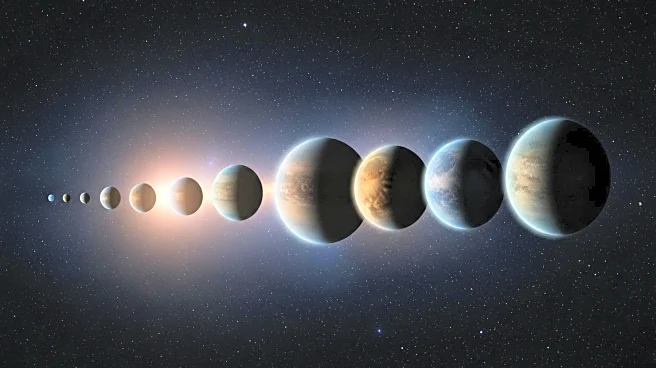What's Happening?
Planetary scientists are currently debating the sequence in which the planets in our solar system formed. Approximately 4.6 billion years ago, a celestial cloud collapsed, leading to the formation of our solar system. The sun was born from a nebula with a strong gravitational pull, but the details of the subsequent formation of planets remain contentious. The most widely accepted theory is accretion, where small particles of gas and dust collide and stick together, eventually forming planets. According to NASA, this theory suggests that large planets formed first, far from the sun, and moved outward, allowing terrestrial, rocky planets to form closer to the sun. However, the streaming instability model offers an alternative explanation, suggesting that terrestrial planets may have formed first, followed by gas giants. Scientists continue to explore these theories, using methods such as crater counting to estimate planetary ages, though these methods have limitations.
Why It's Important?
Understanding the formation order of planets in our solar system is crucial for comprehending the dynamics of planetary systems and the conditions that lead to planet formation. This knowledge can impact the search for Earth-like planets and extraterrestrial life, as it informs scientists about the environments in which planets can develop. The debate between accretion and streaming instability models highlights the complexity of planetary science and the need for further research to refine these theories. The implications extend to the study of exoplanets, as insights gained from our solar system can be applied to other planetary systems, potentially aiding in the discovery of habitable worlds.
What's Next?
Scientists will continue to gather data and refine their models to better understand the formation of planets. Future missions and technological advancements may provide more precise measurements and observations, helping to resolve the debate between competing theories. As research progresses, scientists may develop new methods for dating planets and understanding their histories, which could lead to breakthroughs in planetary science. Collaboration among international space agencies and research institutions will be essential in advancing this field and uncovering the mysteries of our solar system's formation.
Beyond the Headlines
The debate over planetary formation models also touches on broader questions about the nature of the universe and the processes that govern celestial bodies. Ethical considerations arise in the allocation of resources for space exploration and research, as scientists strive to balance the pursuit of knowledge with practical concerns. Additionally, cultural dimensions are evident in the way different societies perceive and prioritize space exploration, influencing public support and funding for scientific endeavors.










